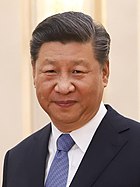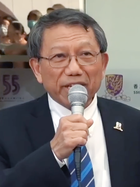2022 Shangean legislative election
| |||||||||||||||||||||||||
700 of the 750 seats in the Legislative Council 376 seats needed for a majority | |||||||||||||||||||||||||
|---|---|---|---|---|---|---|---|---|---|---|---|---|---|---|---|---|---|---|---|---|---|---|---|---|---|
| |||||||||||||||||||||||||
| |||||||||||||||||||||||||
The next election for the Shangean legislative council is due to be held across the month of January 2022. Voting will take place for 700 of the 750 seats in the legislative council. It is the first national election to be held since the start of Normalisation in 2017.
Electoral process
Shangea holds elections every five years for 700 of the seats in the Legislative Council (550 elected by universal suffrage and 150 elected through occupational constituencies). Voting for the directly-elected seats is done through a mixed member majoritarian system with 300 seats elected by single-member plurality voting and 250 members through party-list proportional representation. The proportional seats retain a 5% electoral threshold with the entire country treated as single constituency and are appropriated through the Li-Qiao method. Occupational constituencies use single-member plurality voting.
Voters were given two ballot papers: for proportional seats and for district seats. Voting is either done by paper or through electronic voting in certain localities. Ballots are deposited in clear boxes and voters must dip their right thumb in ink after voting in order to deter electoral fraud. Shangeans living overseas can vote in either the embassies and consulates, mobile polling stations, or by post.
Eligible voters must be Shangean citizens, 18 or older than 18, an ordinary resident of the polling area of the district seats and registered to vote (name included in the electoral rolls), possess a valid voter identification card issued by the National Electoral Bureau. The National Electoral Bureau can bar people from voting if they have comitted certain crimes or show "disrespect for the electoral process". For occupational constituencies voters are chosen by the National Electoral Bureau and approved by the Examination Council.
Voting is staggered over two weeks and held in five stages with different provinces voting during these sections. Voting during each stage lasts from 7AM to 11PM. Campaigning and polling is strictly prohibited during this period. The National Electoral Bureau must release the results of the election 14 days after the final polling stations close.
The National Electoral Bureau announced in December 2021 that 297,859,377 people were on the electoral roll. There are 425,108 polling stations averaging about 700 voters per station. Around 3,500,000 individuals and 14,507 companies vote in occupational constituencies. 28 million people are involved in the running of the electoral process consisting of election officers and polling station guards. A budget of €3.2 billion has been allocated to hold the election.
Background
The last Shangean election was held in 2017 being the first snap election in Shangean history being held as a result of the 2016-17 Shangean Protests. The elections saw the incumbent ruling party, the Society for Restoring Benevolence lose a significant amount of seats and votes despite retaining a majority in the Legislative Council. The results were widely suspected to have been influenced by electoral fraud including ballot stuffing, invalidation of ballots and tampering electronic voting systems with the opposition Democratic Action Alliance (DAA) calling for the Judicial Council to declare the election results as invalid. When the Judicial Council president Yi Shaoqing certified the results as valid the protests intensified. This led to the Shangean government to order a mass crackdown on the protesters on the 28th January and introduce a series of purges against perceived dissent in Shangea. Terming the process Normalisation (Shangean: 拨乱反正; bōluànfǎnzhèng, literally meaning "eliminating chaos and returning to normal") up to 100,000 people were arrested and a further 300,000 dismissed from their jobs.
On the 4th February 41 opposition legislators including the DAA leader Hu Wenjuan and protest leader Chen Qianshi were detained by the Shangean government on sedition charges. The Shangean government also banned the Path of Democracy political party for terrorism with co-leader Kang Yongqing fleeing to Senria. These actions led to the the member parties of the DAA to resign from their seats in the Legislative Council in protest, leaving the Legislative Council without any opposition (dangwei) representation. On the 23rd April 2018 the main dangwei party, the People's Party, re-elected Hu Wenjuan as their leader despite her continued imprisonment leading to the National Electoral Bureau on the 1st June barring the member parties of the DAA from contesting national elections on the basis of "failing to apply by electoral standards".
A partial relaxation of Normalisation measures was made on the 13th May 2018 when the state of emergency declared on the 29th January 2017 was repealed, which also ended an association curfew, the ability to police to search houses without warrants and liberalise some media controls. On the 10th August 2020 State Chairman Yuan Xiannian announced that Normalisation measures would not be renewed for 2021 and that the government would introduce a new National Security Law and constitutional revisions to institutionalise aspects of Normalisation. The constitutional reforms including merging the semi-autonomous anti-sedition courts into the existing judiciary system, moving appointment of judges to be solely the purview of the Judicial Council with approval from the State Presidium and transferring powers from Ministry of Justice to the Judicial Council and the State Presidium. The constitutional amendments also made it illegal to insult Shangea, the Shangean nation, Shangean government institutions, or Shangean national heroes such as the Jianzhao Emperor or Lu Keqian. The reforms also imposed a five year term limit for the premier, vice-premier, ministers and the President of the Legislative Council which can be renewed once and will take effect upon the elections for the Legislative Council in 2022. The reforms were passed by the Legislative Council on the 17th January 2021 and received approval from the State Presidium the next day.
Timetable
| 28 October 2021 | The State Presidium fixes the date of elections from the 7th to 16th January in 2022. |
| 12 November 2021 | Last day members of the public could register to vote. |
| 14 November 2021 | Last day for candidates to file nomination papers. |
| 5 December 2021 | Formal dissolution of the Legislative Council; start of campaign period. |
| 7 January 2022 | Phase 1 of voting in Qigao, Heping, Luoyuan, Baiqiao, Baishadao, Nanqing and Meishan provinces. |
| 10 January 2022 | Phase 2 of voting in Zhongan, Rongzhuo, Wushan, Tuohe, and Chanwa provinces. |
| 12 January 2022 | Phase 3 of voting in Anqian, Weishang, Shenkong, Xiangshan, Yongba and Baozhou provinces. |
| 15 January 2022 | Phase 4 of voting in the occupational constituencies. |
| 16 January 2022 | Phase 5 of voting in Chengchao, Jianghui, Xufang, Zhijian and Yunjin provinces. |
| 16 February 2022 | New Legislative Council Assembled |
Parties
As a result of constitutional reform in 2021 to register for elections in Shangea strict limitations for parties have been introduced. Parties can only run for the Legislative Council if they operate nationally; that is run in all provinces of Shangea (with the exception of Jindao) and have membership in all provinces. Provincial parties must have at least 5,000 members. All parties must be approved by the Examination Council. Additionally, all parties have to abide by the "Five Cardinal Principles" of the Shangean nation with those being -
- National Principlism (国家主体主义)
- Shangean nationalism (晓东民族主义)
- Democracy with discipline (有纪律的民主)
- Social reform (社会改革)
- Society of moralism (道德主义)
The Examination Council approved eight political parties to run in the 2022 election, the lowest since the 1989 Legislative Council election. The majority of these parties have been considered to be part of the loyal opposition that functionally support the incumbent government; only the National Regeneration Movement list is seen to run dangwei politicians on it.
| Party | Ideology | Leader | Alliance | Outgoing seats |
In government | ||
|---|---|---|---|---|---|---|---|

|
Society for Restoring Benevolence | National Principlism, Shangean nationalism | Jiang Zhongyu | None | 420 / 750
|
||
| Association for Promoting Democracy | Shangean ultranationalism, Revanchism | Zhao Xiaojing | None | 76 / 750
|
|||
| Movement for National Principlism | National Principlism, Left-wing populism | Yang Weisheng | National Regeneration Movement | 24 / 750
|
|||
| Democratic Party of the People | Populism, Shangean nationalism | Ding Xifeng | None | 0 / 750
|
|||

|
Shangean Democratic Communist Party | Communism, Democratic Socialism | Wei Pengfei | National Regeneration Movement | 0 / 750
|
||
| Reform and Innovation Alliance | Neoliberalism, Social conservatism | Yin Hong | None | 0 / 750
|
|||
| Liberal Socialist Party | Social democracy, Social liberalism | Dong Xiaotong | National Regeneration Movement | 0 / 750
|
|||
| National Solidarity Party | National Principlism, Religious nationalism | Zeng Bojing | None | 0 / 750
|
|||



